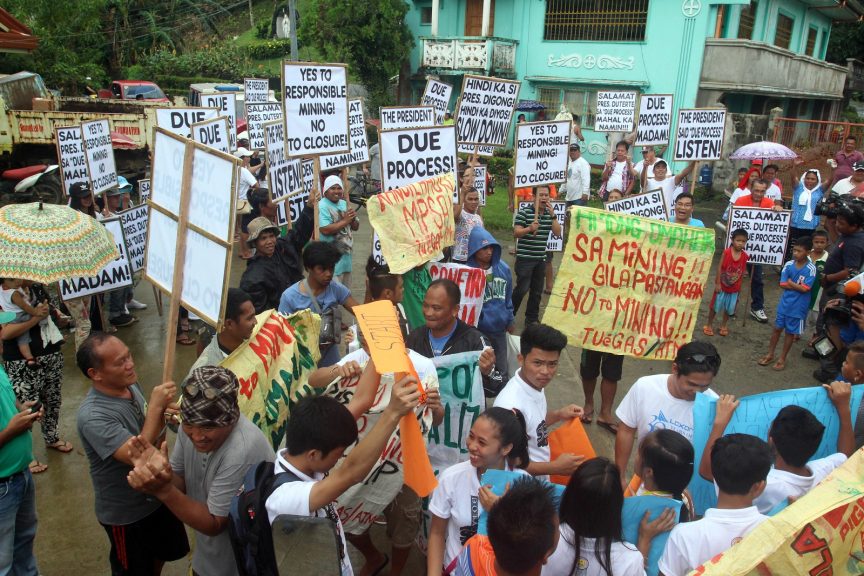DAVAO CITY (MindaNews/20 February) – The Mindanao Business Council (MBC) on Monday said the decision of Environment Secretary Regina Lopez to close 23 mining operations and cancel 75 Mineral Production Sharing Agreements or MPSAs will lead to loss of several jobs in host communities.
“We strongly believe that the welfare and livelihood of millions of poor Filipino families in the affected mining communities should take precedent over the advocacy of a single cabinet secretary who has manifested gross bias against the operation of a lawful industry that has contributed greatly to the upliftment of the lives and future of poor Filipinos in the countryside, “ MBC chair Vicente Lao said in a statement Monday.
Accusing Lopez of “gross bias,” Lao said the council is calling for equal procedural transparency, fairness and observance of the rule of law in the audit of mining operations.
He added the council acknowledges the importance and huge potential of the mining industry to the country’s development.
He described mining as a “critical ingredient” that will facilitate “greater economic growth, attracting investments, creating jobs and reducing poverty in the region, particularly in the rural areas.”
He assured the government will continue to promote responsible development of the mineral resources in Mindanao and optimize the industry’s contributions to the country’s development.
 Pro-mining and anti-mining protesters meet outside the gymnasium in Loreto town in Dinagat Province on Sunday (February 19, 2017). Seven mining companies in Dinagat had been ordered closed by Department of Environment and Natural Resources Secretary Regina Lopez based on an audit conducted by the agency since July 2016. MindaNews photo by Roel N. Catoto
Pro-mining and anti-mining protesters meet outside the gymnasium in Loreto town in Dinagat Province on Sunday (February 19, 2017). Seven mining companies in Dinagat had been ordered closed by Department of Environment and Natural Resources Secretary Regina Lopez based on an audit conducted by the agency since July 2016. MindaNews photo by Roel N. Catoto
“The MBC will continue to clamor for transparency and stronger accountability among the key players in the mining industry as we continue to monitor their social, environmental, and economic performance,” he said.
In a press release last week, the Department of Environment and Natural Resources said Lopez based her decision on the Philippine Mining Act of 1995 that gives her the power to regulate and make decisions pertaining to watersheds, as well as the Forestry Code, which “mandates that surface mined areas should be brought back to its natural state.”
“This is to show you that whatever dictum I make on watersheds, this is in fact protected by the Mining Act of 1995 which says that we must enhance national growth in a way that effectively safeguards the environment and protects the right of the affected communities,” the release quoted Lopez.
It added that last week’s closure of 23 mining operations, 15 of which are within watersheds – were based on the outcome of the industry-wide audit conducted by DENR since July 2016.
“Negligible”
In a note posted on its website last week, the research group IBON Foundation refuted the supposed economic benefits of large-scale mining.
“While mineral exports hit a high of $3.4 billion in 2013, mining contributed a measly 0.7 percent to the gross domestic product (GDP) in the same year. The sector’s contribution grew to this level only from 0.5 percent after more than a decade of operations.
“The annual average share of mining revenues to total government revenues in 2009-2012 was only 1.18 percent. The contribution of the mining and quarrying sector to employment was also negligible at 0.7 percent of total employment,” IBON said.
“Aside from human deaths, large-scale mining has caused damaged dams, soil and water pollution due to excessive tailings, siltation, contamination and damage to agricultural lands, fish kill and other damages to marine life,” it said.
“More than 90 percent of Philippine mineral production is exported for use by other countries’ steel industries while the country has none. This, despite the Philippines being one of the world’s top producers of gold, copper and nickel,” it added. (Antonio L. Colina IV/MindaNews)
